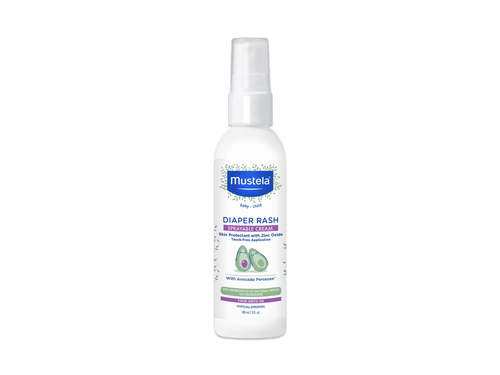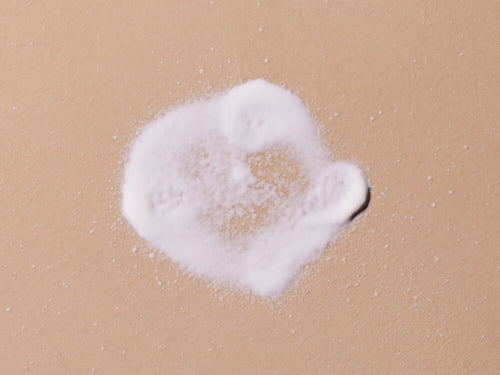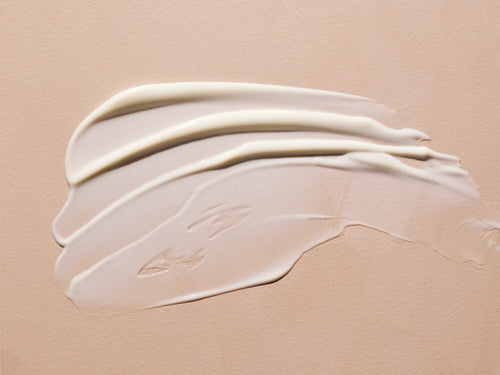Newborn constipation isn’t all that common, but it can happen from time to time. In this article, we’ll discuss the signs, causes, and treatments of newborn constipation so you can help your little one feel better fast.
Table Of Contents
Signs Of Newborn Constipation

1) Hard, Dry Stool
One of the first signs of newborn constipation that you may notice is hard, dry stool in your baby’s diaper.
It’s this hard, dry stool that is causing all the problems — it’s more difficult to move so it can back up in your little one’s digestive system.
When these backups occur, they can lead to the other signs mentioned on this list.
As we mentioned earlier, infant constipation isn’t all that common, but if you do notice hard, dry stool in their diaper for several changes, try some of the treatment options in this article and then consult with a pediatrician.
2) Loose, Watery Stool
Normal infant stool is typically soft and mushy, so if you notice loose, watery stool during their diaper change, it could be a sign of newborn constipation.
Your baby’s digestive system is working to remedy the situation by pulling water into the bowels in an attempt to soften the backup and make it easier to pass.
Because of the extra water in their system, your newborn may experience diarrhea for a few diapers before passing the obstruction.
Keep in mind that diarrhea of this kind could be caused by other things — even a change in your diet if you’re breastfeeding — so be sure to rule that out first.
If this symptom persists for more than a few days, schedule an appointment with your little one’s pediatrician to have them checked out.
3) Less Stool Than Usual
Another sign of newborn constipation is less stool than usual appearing in your baby’s diapers. The backup in their system causes them to have fewer bowel movements while their body works to flush the obstruction.
If you notice that your infant is making fewer poopy diapers, talk to your doctor for advice.
Keep in mind, though, that the frequency of their bowel movements can vary depending on their age and what they’re eating. Even babies who are breastfeeding exclusively may sometimes skip a messy diaper or two.
That said, if they suddenly switch from a regular schedule of wet diapers to fewer wet diapers, talk to a pediatrician as soon as possible.
4) Signs Of Straining More Than Normal

If you notice your baby straining more than usual to make a poopy diaper, it could be a sign of newborn constipation. But straining doesn’t absolutely mean that your little one is constipated.
Sometimes, a baby will strain even if their stool is soft and mushy because their abdominal muscles haven’t fully developed yet.
But if you notice extra straining in combination with either hard, dry stool or loose, watery stool, there could be a backup.
It never hurts to try the treatment options in this article — even if your baby isn’t constipated — so feel free to do so anytime to see if that makes them feel better.
5) Bloating
It’s not always easy to tell if your baby is bloated, but if you notice that their tummy is a bit rounder or harder than usual, there could be extra gas in their bowel.
This gas accumulates because the stool spends extra time in the colon where it’s exposed to bacteria that cause the waste to ferment even more than usual. Once the blockage has passed, the gas should work itself out and the bloating should go down.
If the bloating persists, along with the other symptoms on this list, consult with a pediatrician to find out what to do next.
6) Stomach Cramps
Stomach cramps in newborns are even more difficult to diagnose than bloating. But, if your little one starts to cry for no reason and then stops just as abruptly, it might be a sign that they’re experiencing abdominal pain.
These types of cramps often develop before the gas builds up in their system, but be sure to check for bloating if you suspect there’s a problem.
At the very least, it will give you a good idea of what their belly would look and feel like normally so you can tell when a change occurs.
Keep in mind that your baby will cry for a variety of reasons. Just because they cry out of the blue, it doesn’t mean they’re experiencing stomach cramps.
Use this sign in conjunction with others to help you figure out what’s going on. And don’t be afraid to schedule an appointment with a pediatrician. Even if nothing’s wrong, it’s better to play it safe.
Causes Of Newborn Constipation

1) Switching From Breast Milk To Formula
One of the biggest causes of constipation in infants and newborns is switching from breast milk to formula (or vice versa).
Any change in a baby’s diet can cause their digestive system to deviate from normal.
In older babies (4 to 6 months), this is usually the result of switching from formula to solid food or introducing completely new solid foods.
2) Changing Formula
Another cause of newborn constipation is changing the formula they eat.
There are any number of reasons you might have to switch brands or types of formula, but such a drastic change can result in a bit of constipation until your baby’s digestive system can adapt.
3) Illness
While the illness itself probably isn’t the cause of your newborn’s constipation, the fact that they don’t feel well may mean that they aren’t eating as much as they usually do.
The lack of water, vitamins, and minerals can cause waste to move through your infant’s colon at a slower-than-normal rate. As a result, they may develop constipation on top of the illness from which they’re suffering.
4) Medication
It’s important never to give medications to your newborn without consulting their doctor first.
If your healthcare provider does recommend a specific course of treatment, that medication may be the cause of your child’s constipation.
If your little one is taking medication and they develop the signs of constipation, talk to your doctor again to make sure everything is OK.
5) Genetics
Genetics can also play a role in newborn constipation.
While this doesn’t typically manifest until your baby transitions to solid food, there could be a genetic reason if your newborn can’t stomach breast milk or formula.
Again, talk to a pediatrician for advice on how to proceed.
Treatment For Newborn Constipation

1) Consult A Doctor
If you suspect that your little one is suffering from newborn constipation, speak with your pediatrician.
That said, even if you’re sure that your baby is constipated, you may wish to try the other treatments on this list before scheduling an appointment. Chances are, they’ll tell you to try these remedies first to see if they help your baby’s body pass the blockage.
If any symptoms last for two weeks, or if the signs of constipation are accompanied by other symptoms (e.g., fever or bloody stool), reach out to your child’s doctor.
2) Give Your Baby A Warm Bath
Giving your baby a warm bath is a good first step to help them overcome newborn constipation.
The warm water, pleasant smells, and physical contact can help them start to relax enough to pass the stool that’s causing the problems.
3) Move Their Legs
Your baby doesn’t have the coordination to do this on their own yet, but that doesn’t mean you can’t help.
Gently take hold of their ankles and move their legs like they’re riding a bike. The rhythmic back-and-forth motion helps stimulate the bowels and get things moving inside.
Make this a fun baby-and-me time by introducing an element of play, but don’t force it if your baby resists.
4) Give Them A Massage
Giving your little one a baby massage doesn’t have to be a long, complicated process. Simply rub your newborn’s belly in a gentle clockwise direction to help ease the discomfort of newborn constipation.
You can also try more involved techniques, such as tummy spirals, thumb circles, and twists to help get things moving.
Keeping Your Baby Comfortable

Newborn constipation is difficult for everyone — infants and parents alike.
If your little one shows signs that they might be backed up and you’ve tried the home remedies mentioned earlier, don’t hesitate to consult your doctor. They can give you specific advice to help your baby feel better.
While the constipation persists, do your best to keep your little one as comfortable as possible with warm baths and massages (our Soothing Cleansing Gel and Baby Oil make these activities even more enjoyable).
Once the constipation has passed, your little one will be back to their usual happy self!












